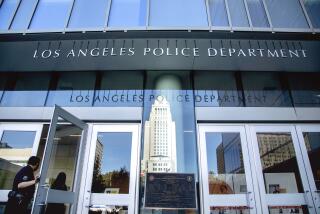South Africa Revamps Embattled Police Force : Overhaul: Government to retire 13 top white generals in bid for credibility. The ANC says it isn’t enough.
PRETORIA, South Africa — The government, trying to restore the credibility of South Africa’s police, announced a major overhaul of the 114,000-member force Thursday that included early retirement for 13 top white generals and an independent board to investigate police officers accused of serious crimes.
Law and Order Minister Hernus Kriel, in making the announcement, also halted the force’s discriminatory promotions policy, opening the way for black officers to be promoted to the rank of general.
The changes were part of a broad effort by the white government to improve the image and effectiveness of its police officers, who are widely feared and distrusted in black townships racked by violence and lawlessness.
But, like so many of the unilateral reforms undertaken by President Frederik W. de Klerk’s government, they fell short of meeting the conditions set by the main black opposition, the African National Congress, for a return to the negotiating table.
And now, 2 1/2 months after the ANC suspended constitutional negotiations, the ANC and the government remain at frustrating odds over the future. Although their disagreements are many and varied, the widest gap between them is over power--and who will have it in the “new South Africa.”
The ANC has demanded the immediate creation of a multiracial interim government to run the country, while De Klerk insists on maintaining power until a formal blueprint for the future is drawn up in negotiations.
“The essential gap is over the question of who is going to have their finger on the button,” said Robert Schrire, a professor of political studies at the University of Cape Town.
“All these reforms are still unilateral,” Schrire added. “It’s still the all-powerful government doing good deeds rather than giving up any power. And that’s what the whole game is really about.”
The police force overhaul, although welcomed by many government opponents, was criticized by the ANC on Thursday as “a face lift” that did not amount to substantial change. Until the police force is placed under the control of all South Africans, black as well as white, it will lack the credibility necessary to do its job effectively, the ANC said in a statement.
Kriel, the law and order minister, acknowledged that the police force reforms were decided upon without consulting the ANC, which, he noted, currently refuses to talk with the government.
In fact, the government and the ANC are in the midst of closed-door talks to resolve their differences and resume formal negotiations. Government officials said those talks were “at a sensitive stage” but would not comment further.
The country’s security forces, including the police as well as the South African Defense Force, have been under relentless criticism in recent weeks.
The ANC contends that the security forces have fomented political violence in the townships and have been unwilling to enthusiastically investigate allegations of police wrongdoing.
A British police expert, who studied the police probe of a June massacre of more than 40 blacks in the Boipatong township, said the force showed bias against ANC supporters, used poor investigative procedures and relied too heavily on a “confessions-oriented” style of policing.
A respected independent pathologist, Dr. Jonathan Gluckman, also recently complained that dozens of blacks had died in police custody, and he contended that the police were “out of control.” Since Gluckman went public last month, 10 blacks have died in police custody and several others have died after questioning by police.
The changes announced Thursday were designed to address a wide variety of shortcomings in the force, including its adversarial relationship with the black majority and, especially, the ANC.
Kriel said he is creating a new division of “community relations” to consult with the public and a special subdivision “to sensitize (police officers) about the changed environment in which policing must take place.”
More to Read
Sign up for Essential California
The most important California stories and recommendations in your inbox every morning.
You may occasionally receive promotional content from the Los Angeles Times.











